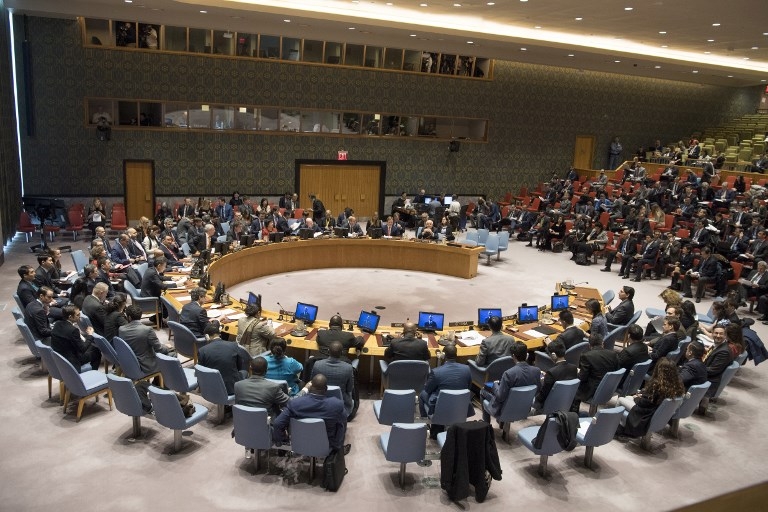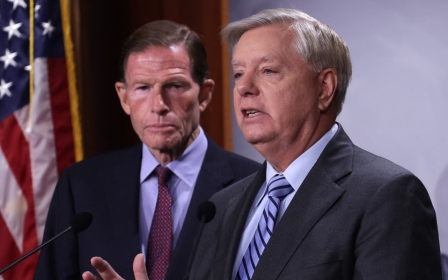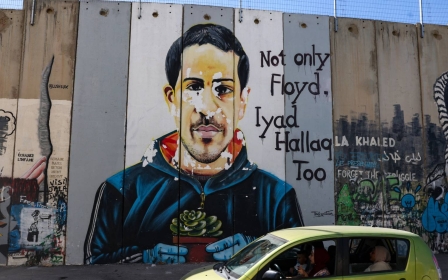UAE and China call for UN Security Council meeting on Al-Aqsa Mosque storming

The United Arab Emirates and China have called for a United Nations Security Council meeting to discuss Itamar Ben-Gvir's storming of Al-Aqsa Mosque's courtyards in occupied East Jerusalem.
Israel's far-right national security minister entered the courtyards on Tuesday accompanied by heavy security, in a highly provocative move that drew condemnation from his country's allies in the West and Middle East.
Al-Aqsa Mosque is one of the holiest sites in Islam, and while it is similarly sacred to Jews, a longstanding agreement - as well as common Jewish practice - forbids Jewish prayer there.
According to diplomats, the Security Council meeting is likely to occur on Thursday.
New MEE newsletter: Jerusalem Dispatch
Sign up to get the latest insights and analysis on Israel-Palestine, alongside Turkey Unpacked and other MEE newsletters
Ben-Gvir's provocative actions have been compared to those of Israel's former prime minister Ariel Sharon, who made a similar trip to the site in 2000, sparking the Second Intifada Palestinian uprising.
Among those condemning the visit, which both the Palestinian Hamas movement and Israeli opposition warned could spark dangerous escalation, was the United States.
"The United States stands firmly... for preservation of the status quo with respect to holy sites in Jerusalem," White House press secretary Karine Jean-Pierre said.
'The United States stands firmly... for preservation of the status quo with respect to holy sites in Jerusalem'
- Karine Jean-Pierre, White House press secretary
"Any unilateral action that jeopardises the status quo is unacceptable."
Separately, State Department spokesman Ned Price said that the visit "has the potential to exacerbate tensions and to provoke violence".
The United Arab Emirates, which normalised relations with Israel in 2020 as part of the US-backed Abraham Accords, also released a statement of condemnation.
"The UAE today strongly condemned the storming of Al-Aqsa Mosque courtyard by an Israeli minister under the protection of Israeli forces," said the statement.
It called on "Israeli authorities to assume responsibility for reducing escalation and instability in the region".
Jordan's foreign ministry also summoned Israel's ambassador.
"Jordan condemns in the severest of terms the storming of the Al-Aqsa mosque and violating its sanctity," the ministry said.
Religious importance
Jerusalem's al-Aqsa Mosque draws tens of thousands of pilgrims from across Palestine and the wider Muslim world each year.
It is also the site of the Jewish temple destroyed by the Romans in 70 CE.
Non-Muslims are allowed to visit the mosque, though prayer is prohibited and access to the Dome of the Rock shrine and Qibli prayer hall are restricted.
Since the Israeli occupation of East Jerusalem began in 1967, the site has been the subject of contention between Muslim worshippers and those groups that want to restore full Jewish control over the area.
Since the 1967 Middle East war, Jewish prayer at the site has been forbidden, though far-right settlers such as Ben-Gvir have frequently prayed there under heavy security in recent years.
Middle East Eye delivers independent and unrivalled coverage and analysis of the Middle East, North Africa and beyond. To learn more about republishing this content and the associated fees, please fill out this form. More about MEE can be found here.




